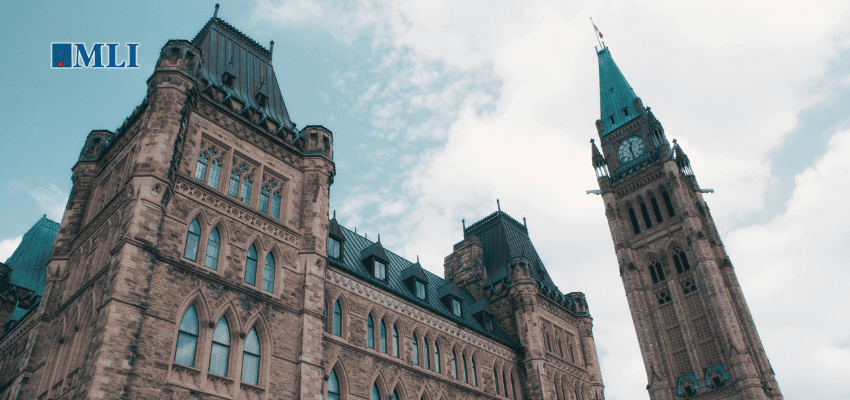This article originally appeared in the Ottawa Citizen.
By Ryan Khurana, May 7, 2025
On the campaign trail, Prime Minister Mark Carney listed artifical intelligence (AI) as one of five critical sectors to form the backbone of his industrial strategy. With Carney now set to govern, that’s noteworthy because — compared to other fields — Canada’s greatest AI opportunity lies in an unexpected domain: government itself.
The federal government represents an ideal proving ground for AI transformation. Ottawa’s constitutional commitment to peace, order and good government reflects Canadians’ expectations for reliable, timely essential services. Since 2015, the number of federal public servants has grown more than 40 per cent, and government spending has risen by more than 58 per cent. But this has not translated into improved service.
For example, complaints about Canada Revenue Agency wait times increased 45 per cent in 2023, and increased spending on health care, education and the justice system hasn’t delivered reduced wait times, better test scores, or improved court system outputs. When backlogs emerge and service standards decline, costs multiply for citizens and the economy.
Ottawa’s recently announced AI strategy for the federal public service marks a thoughtful first step. But what’s missing is a vision for true change. Government’s AI opportunity isn’t about adding new tools to existing workflows; it’s fundamentally reimagining public service delivery around AI.
To build an integrated AI supply chain that translates Canadian frontier research into tomorrow’s industrial giants, policymakers must focus not only on funding; they must also see government as the first-resort buyer.
The immigration system exemplifies AI’s deeper potential. Our current points-based system is inflexible to rapidly changing labour markets. Employers seeking specialized talent face years-long waits as tens of thousands of applications languish in processing queues. Express entry moves no faster. Meanwhile, applicants often pad credentials or buy job offers to spike their scores, undermining the link between points and economic value. The system is gamed by some, while hurting qualified candidates.
AI can do more than patch leaks
We’ve tried to fix these bottlenecks by building elaborate scaffolding around longstanding inefficiencies. But AI doesn’t just patch the leaks; it lets us rebuild the entire pipeline.
AI solutions could frequently analyze labour market data so points allocation is based on current needs. Models could identify patterns of historically successful economic integration, enabling a more holistic assessment of applicants. AI could enhance fraud detection, making the system work for those it was intended to bring to Canada. By automating routine processing tasks, immigration officers could dedicate more time to complex cases requiring nuanced human judgment.
The benefits extend far beyond immigration. From tax filing to infrastructure permitting to health-care resource allocation, this redesign would deliver good government while strategically supporting local firms at the forefront of the next industrial revolution.
Government leadership would catalyze Canada’s AI adoption through three critical mechanisms. First, the federal government would establish implementation models that private enterprises — particularly small and medium-sized enterprises — could adopt without re-inventing the wheel. Second, government procurement would create robust demand, helping promising Canadian tech startups such as Cohere scale into global competitors. Third, it would provide research institutions like Mila, Vector Institute and AMII promising pathways to commercialize Canadian innovations.
Canada’s government has a history of acting as a first-resort buyer. In the 1970s, its strategic support for Northern Electric’s development of digital switching was pivotal in transforming the nation’s telecommunications infrastructure. This initiative modernized communication networks and propelled Canadian firms to the forefront of global telecommunications. It’s time for that same leadership, defining an ambitious AI vision rather than being a reactive adopter of vetted use cases.
Realizing this opportunity requires a comprehensive process audit. The auditor general should provide a roadmap for change by leading a government-wide initiative to identify bottlenecks that AI could eliminate.
Certainly, legitimate concerns about privacy protection and algorithmic bias must be addressed through robust governance frameworks. But the greater risk lies in perpetuating inefficient systems while other nations forge ahead.
The government has invested substantially in research programs such as the Pan-Canadian AI Strategy. Now it must complete the innovation cycle as an exemplary adopter. By fundamentally reimagining government operations, Canada can establish global leadership.
The technology exists; the expertise exists. What’s needed now is the vision to recognize that government itself represents Canada’s greatest AI opportunity.
Ryan Khurana is a senior fellow at the Foundation for American Innovation, and a contributor to the Macdonald-Laurier Institute.






